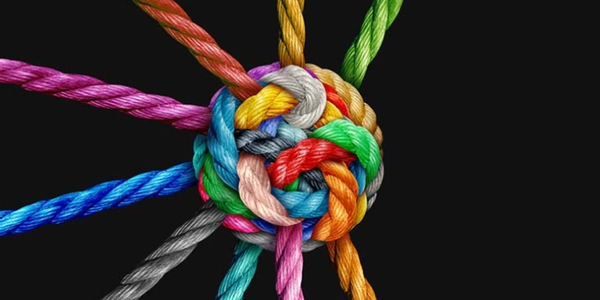Weekend Edition: Just better strategy
We need adaptable, creative strategies to confront the challenges and embrace the opportunities we are facing and that kind of adaptable creativity only emerges from diverse teams.

Our relationship to others is a reflection of the expansiveness of our understanding of ourselves and our role in the world. If the world is small and mean and if power and resources are zero-sum commodities, then defending what we have at all costs and engaging others primarily as threats is the only path to our continued thriving. If the world is full of abundance and possibility, others can be a source of creativity and adaptability, the engine of a generative society, and our partners in collective solidarity.
The latest attempts to scrub the very idea of diversity from government is the latest salvo in the long glorification of the smallness of a sad, low ceiling for society out of fear of the uncertainty that a bigger, broader, more vibrant society is not only possible but will actually include and empower everyone. As we look for reforms to make our systems and institutions more just, we often find ourselves creating new labels, new mechanisms, new levers to try to change them, setting up entirely new parallel categories with their own vocabularies. Too often these new categories and new vocabularies are defined in the language of the people we're trying to free rather than the people who need to grow and evolve and change. As we disentangle the moral design of more just systems from the strategies we need to achieve them, we must be careful with the language we use and conscious of the categories we create and fight for. Audre Lorde reminded us about the master's tools, but as we create new ones and get them in the hands of new people, we must also be careful that we aren’t accidentally allowing the existing behaviors and containers to persist.
Failing to do the hard work of fighting for categories rather than creating new ones leaves these new categories open to being trivialized, marginalized, attacked, and eliminated and too often leaves the original categories unchanged. When we abandon unhealthy structures and categories for more beautiful, more just spaces, the old ones don't disappear. We cede them unchallenged, and they get even less healthy, less creative, less just. The new vocabularies we do create must not undermine the moral clarity of transformation but must resonate with the people whose behavior has to change and that means shifting the definitions and practices of current categories and institutions. But importantly, the people who are safer in these unhealthy spaces need to be the ones to do carry that water. If people need to leave them to thrive safely, they should. And we cannot afford to make it easy for those who have bought into the zero-sum lie about humanity to set the moral terms of our systems and revert to the smallness they know and guarantee their own power and vibrance – at the expense of power and vibrance for everyone.
From Axios (last year):
The bottom line: Companies started caring about diversity a lot more after a flurry of lawsuits — with employees alleging race and sex discrimination — in the 1990s and early 2000s, as this Harvard Business Review piece explains.
Now a new kind of litigation risk is sending them in the other direction.
From Axios (last week):
Why it matters: [Government purges of DEI] builds on the anti-DEI activist pressure of recent years, and could pave the way for a world where the government prosecutes, not protects, corporate diversity efforts.
The bottom line: Corporations were already rolling back diversity programs and policies, partially in response to attacks from conservative groups.
From Axios (this week):Goldman Sachs is canceling a pledge to ensure diversity on the boards of companies it helps go public.
Why it matters: It's the latest corporate rollback of diversity, equity and inclusion initiatives following conservative blowback and a series of court rulings calling certain quotas into question.
Goldman Sachs is making these choices despite research from McKinsey and the Corporate Governance Board (not exactly progressive thinktanks) that companies with more diverse boards are more profitable. So not only are they making the wrong ethical and moral choice, they are making the wrong economic choice out of fear and some kind of misplaced, misguided idea of libertarian fairness nonsense.
If risk aversion and a zero-sum perspective is your foundation for strategy, you're driven by an instinct to protect not an instinct to expand or desire for justice. DEI, ESG, sustainability, corporate philanthropy, social impact, corporate purpose, etc — all these new categories are meant to create more dimensions of a more comprehensive, better strategy. Just fucking call it strategy. Strategy has traditionally included all kinds of dimensions like go-to-market, pricing, organizational design, talent, capital investment, etc etc, and it also tends to undervalue people as either a cost center to be minimized or commodity to build upon rather than the source of our creativity, power, and knowledge. In politics, people often say “people are policy” because who is in a given role tends to determine the values and practices of the policies they create. In any team, people are also strategy. Yes, institutionalizing culture and process and knowledge is important, but an essential way to achieve each is by developing and retaining people. It is our understandings of what a good team is and what good strategy is that take into account the full and true nature of what our work requires that must expand.
Understanding the world with more complexity, a longer horizon, and a willingness to take into account more interconnected stakeholders is smarter strategy. Building more teams capable of more adaptable thinking and more creativity is better strategy. We must stop ceding the category of “strategy” to short-sighted small mindedness disinterested in expanding its circle of care or putting humanity before profit who claim that that is somehow strategic because it is efficient. Self-centeredness is not strategic. By ceding strategy and creating a new category, we also make it easier for opponents of creative adaptable transformation to attack, villanize, and ultimately kill off these components of work. No one would advocate for eliminating the CEOs office or the chief revenue officer, but we must change what it means to do that work well. It is not possible to do any of that work well without the creativity and adaptability that comes from broader perspectives and more diverse ideas.
A more expansive perspective on strategy demands a broader perspective on the world as a whole and that broader perspective demands we change our relationship to novelty and difference. If love in the context of social ethics is the persistent interest and attention to the suffering of others, then it demands of us as a beginning a persistent effort to be open to others and to see them at all. For our diversity to be the real source of creativity and adaptability we know it can be in a generative society, to be curious about others and expansive in our perspectives, we need to find ways to greet diversity as a source and to celebrate difference while integrating new ideas and experiences rather than tolerating divergence from inherently problematic norms. Tolerance is profoundly limiting if we are only willing to accept some limited divergence from an arbitrary norm and generally won’t allow anyone to stray too far or try to change the norm itself (even if for the better). And our norms are typically built on small minorities which is not only extremely limiting but also, when combined with an existential threat posture to others, extremely dangerous. Celebrating difference and seeking real cooperation is about creating something collectively that all members of a team, a group, a community will celebrate as great. It means all integrate, all own, and no one settles. It’s much more complicated, but it's not hard – and much, much more beautiful, generative, and expansive.
Homogenous groups are fragile and struggle to adapt to changing conditions or reimagine themselves. And the experience and defining characteristic of natural, healthy, vibrant systems is complex interdependence. If this is how diversity leads to creativity and an expansive, energetic, vibrant society integrates great ideas and cultures and beauty in multiple dimensions without hierarchy, what might it mean to celebrate difference more broadly in more contexts? As an exercise in transformation of our current systems this might present as a process of de-pathologization. Not an effort to call unhealthy healthy, but to say normal is an unhelpfully narrow anchor, too low a ceiling defined by too narrow a set of experiences. (See, for example, how our ideas of personal and social psychology arise from a narrow understanding of a very small group of very unrepresentative humans in The WEIRDest People in the World.) Normal is an often arbitrary, but always problematic normative standard to measure and deviate from.
We all (and I mean all) need things to thrive. And we all need to see others like us to feel that we belong and to feel safe which is required to greet the world with curiosity. Diversity is a source of the creativity necessary to develop adaptable strategies – but only if we can greet it as source not threat. What do I need? What do you need? What do we need? How can we ensure we all get what we need to thrive? And what we need to build adaptable complex strategies to greet the future is wildly diverse teams capable of seeing the world through the multiple lenses of curiosity and creativity concurrently required to meet and adapt to the moments that are coming. That is just better strategy.
Last updated: 15 Feb 2025




